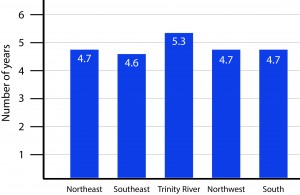By Mathew Shaw/se news editor

The State of Texas wants to get two-year college students out quicker.
As a result, the state now allocates 10 percent of community colleges’ funding based on their graduation rates, rather than enrollment.
For students like Sebadet Shabani, however, graduating within the legislature’s ideal time frame is not possible.
Being a 37-year-old single mother, Shabani attends school part time and works as an emergency room technician at Arlington Memorial Hospital, all while raising three children at home. She has attended SE Campus since 2006.
“There are a lot of obstacles,” she said. “It’s just been really tough.”
Coming from a conservative patriarchal cultural background, she got married at 15 as part of an arranged marriage and had her first child at 16. Her then-husband and his family would not allow her to go to school. After separating from her husband, however, she got her high school diploma and attended trade school.
Recalling her culture’s attitude toward women’s roles, Shabani said, “You’re taught and bred to just be a housewife and nothing more.”
A second-generation Albanian, Shabani said she now rejects her country’s strict gender roles.
“I would say I’m very Americanized,” she said. “I’m the first in my generation that’s ever had a divorce.”
Among the difficulties Shabani has is scheduling her classes and work hours around her family life. For example, a lab she has to take Thursday mornings prevents her from taking her children to school, so she has to drop them off at her mother’s house Wednesday evenings.
“The morning class really messed up my whole routine,” she said.
Shabani works shifts at the hospital when she is not taking classes.
“I’ll be lucky if I could get six hours of sleep,” she said.
Despite her hectic schedule, Shabani says she tries to make time for her children. She took last summer off from school for that reason.
“I’m all they have,” she said. “I also have to think of them.”
Shabani talks to her children all the time about the importance of school. She wants to let them choose what they want to be in life, a chance she did not get when she was young.
“That’s number one,” she said, “my children and school.”
According to data from the 2013 Texas Public Higher Education Almanac, TCC students take anywhere from an average of 4.6-5.3 years to complete their associate degrees. For SE students, that figure is 4.6 years.
The cost of attending college and receiving a degree is one concern for State Rep. Chris Turner, D-Arlington.
“The reality is, most colleges are expensive, and most families, most students, need help,” he said. “I think the best way to do that is through increasing student financial aid.”
Tuition and debt were some things SE student Michelle Ontiveros was concerned with at the beginning of her college career. When she finished high school, she did not know what the FAFSA was.
“One of my goals was not having to get a student loan at all,” she said.
Ontiveros has been attending TCC on and off since 2008. By the time she started school, her father had returned from Afghanistan with several injuries. At the time, she was attending school full time while she and her mother both worked minimum-wage jobs.
“It’s basically like two teenagers working in the house,” she said. “We were going through a recession, too.”
Then, in 2011, she became pregnant.
Ontiveros said the pregnancy made her sick and made her lose over 50 pounds.
“I was full time taking summer classes, and I had to drop all my classes because I was sick,” she said.
This was a problem because the military insurance she was receiving through her parents required her to attend school full time.
During her pregnancy, Ontiveros was hospitalized after going into pre-term labor. Then she got hit by a drunk driver.
“I had to go back to the hospital to make sure my baby was OK,” she said. “I was only 20 weeks along, so [the baby] was small enough to not get hurt.”
After she gave birth to her daughter, she began to have gall bladder pains and had to have surgery. She returned to the hospital after an infection developed in one of the incisions.
Then, after getting married in October that year, she began itching all over.
“I’m talking about crackhead itching,” she said. “I had sores up and down my legs from when I had been scratching.”
When she inquired about the itching, she was misdiagnosed as having hepatitis. Seeking a second opinion, she returned to the hospital and learned she actually had gallstones. She had surgery again in November.
After her daughter turned 1 and her father finally qualified for full disability benefits, she returned to school.
Now she is debating whether or not transferring to the University of Texas at Arlington is worth it.
“I don’t want student loans,” she said. “I don’t want any more debt on top of what I have.”
She also said nobody is guaranteed a job after school.
“I know people that are in the field that I want to study [social work], and I get paid more than what they start off as,” she said.
Ontiveros works at Home Depot.
Now, Ontiveros is proud just to be in school.
“I always told myself I am going to college,” she said. “You never know where life is going to take you.”


























